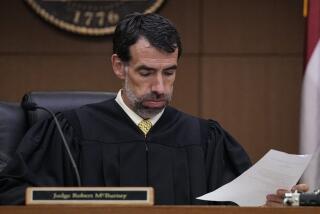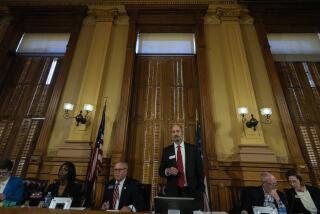The Court Sifted Through the Issues Well
- Share via
The Florida Supreme Court’s decision Tuesday represents a well-reasoned and balanced accommodation among several ambiguous and conflicting statutory provisions. There is room for disagreement with the court’s analysis, as there usually is in difficult cases, but no legitimate room for questioning the court’s integrity or its commitment to the rule of law.
In particular, Bush spokesman James A. Baker’s harsh response that the court “rewrote the Legislature’s statutory system, assumed the responsibilities of the executive branch and sidestepped the opinion of the trial court as fact-finder” is intemperate, unwarranted and unbecoming to a lawyer of Baker’s stature.
The statutory framework is complex. One provision says that tallies “shall” not be counted after Nov. 14, another that they “may” not be counted. The secretary of state initially took the position that the “shall” provision controlled and that she could not accept tallies of manual recounts after that date. A trial court disagreed, ruling that she had discretion to continue to accept tallies. The secretary then purported to exercise her discretion to refuse tallies, maintaining that manual recounts were permissible only when there was some machine defect.
The trial court accepted the secretary’s explanation, but it engaged in no independent analysis and no “fact finding” of any kind. Thus the issue on appeal, though phrased in terms of the secretary’s discretion, boiled down to questions of statutory interpretation: Did Florida statutes allow manual recounts only in the case of machine defects and, if not, what criteria should determine the cutoff date?
While Florida law allows for some discretion on the part of administrative agencies in the interpretation of such statutes, the secretary had engaged in no rule-making or, for that matter, any reasoned statutory analysis beyond her view that manual recounts were inappropriate under the circumstances. Thus, the Supreme Court was called upon to provide an interpretation.
The high court considered and rejected the secretary’s narrow view of the role of manual recounts as inconsistent with the language of the statutes. It went on to reject her rigid view of the Nov. 14 deadline, finding it inconsistent both with the permissive language of the controlling statute and--taking into account the time required for manual recounts in large counties--with the legislative determination that manual recounts were allowable.
A proper reading of all applicable statutes, the court concluded, would allow manual recounts to continue so long as there was sufficient time for post-certification challenges prior to the Dec. 12 deadline for selection of the state’s electors. Reasoning that the exigencies of the situation required the court to set the cutoff date, rather than invite yet further consideration by the secretary, which would trigger further judicial proceedings, the court ordered the secretary to accept the results of manual recounts until next Sunday.
There is no usurpation of legislative or executive authority here, no irresponsible “activism.” The Florida Supreme Court did its best, under extreme pressure, to discern legislative purpose behind a complex maze of statutory provisions and come up with a pragmatic solution. The court did its job well and deserves commendation, not irresponsible attacks from people who should know better.
More to Read
Sign up for Essential California
The most important California stories and recommendations in your inbox every morning.
You may occasionally receive promotional content from the Los Angeles Times.













